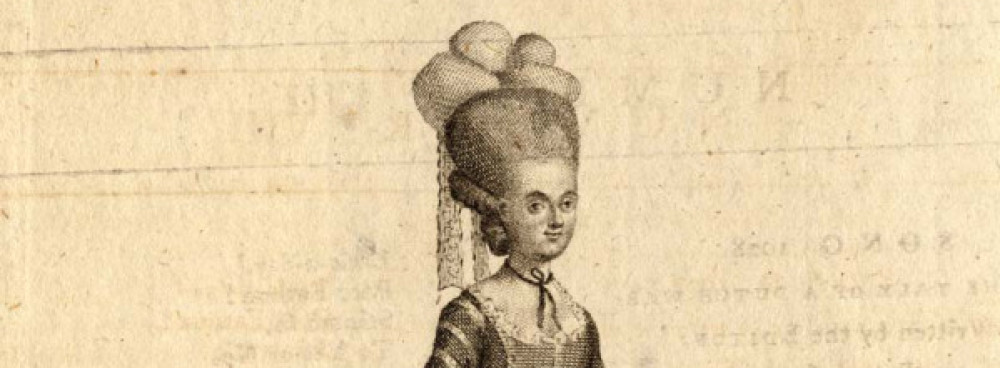This actress and singer, according to William Dunlap, contemporary and historian of the American theatre, was a “genteel and amiable young lady,” hired as a “second singer in serious opera”(Dunlap, History of the American Theatre, 241). The Philadelphia General Advertiser of September 10, 1793 reported:
Miss Broadhurst and Mr. Marshall, late of Covent Garden Theatre, Mrs. Shaw of Drury Lane House, with several other performers, sailed for America on the 13th July to fulfill their engagements with the manager of the Philadelphia Theatre—so says a London paper of July 18th.
Miss Broadhurst came to the United States with her mother and that she left the Philadelphia company after the first season; however, Philadelphia newspapers, reporting on theatrical offerings of the Chestnut Street Theatre list her as a regular performer there until 1796, when she became a member of the New York Company (Dunlap, History, 241).
An article entitled “Musical Reminiscences” in The Euterpeiad of March 1822, outlined her talent, noting that she had begun performing at a very early age in London, and that her voice was “remarkably sweet and clear.” The article also complimented her “lady-like appearance,” and her “charming and modest deportment” and approvingly notes that “in her private life, Miss Broadhurst gave no indications of the professional woman.” Instead, Miss Broadhurst was “artless and amiable—cheerful and engaging.” The author adds that she was “more fortunate than most dramatic vocalists,” in that she had inherited “some property in the British funds,” and that she was in demand as a teacher of both piano and voice. She then could avoid “dramatic engagements whenever terms, situation or other circumstances were not agreeable to her wishes (“Musical Reminiscences” The Euterpeiad: or; Musical Intelligence, and Ladies Gazette, 2 March 1822).

Chestnut Street Theatre By Birch, William Russell, 1755-1834 (Scan) [Public domain] via Wikimedia Commons
Miss Broadhurst’s voice was “remarkably sweet and clear—her time, exactness itself—her intonation correct, rather inclined to sharp without being positively so, a quality said by some late critics to give great brilliancy of effect. . . .” She also was an accomplished pianist and she often gave lessons in both piano and voice (Ritter 188).
According to the Biographical Dictionary of Actors, Miss Broadhurst came to America with her mother and a number of other actors, all bound for the Philadelphia theatre; however in 1793, they could not stay in Philadelphia, for “death, in the loathsome form of yellow fever, had established himself in the beautiful city of Philadelphia, in the citadel which had been prepared for the reception of Mirth and her attendants” (Dunlap, History, 177-178). Until they could relocate to Philadelphia, the company played in Annapolis and in Baltimore. For at least part of this time, the actors were “quarter[ed]…in farm-houses or taverns” (Dunlap 177). Thus, after a sea voyage of several weeks, Miss Broadhurst and the other actors were displaced, with no permanent housing, and with tenuous assurance of continued employment.Dunlap commented that she was part of “great company” at Philadelphia and that she left that company after one season. During her brief career in the United States, she performed with the Chestnut Street Theatre in Philadelphia, the John Street Theatre in New York, the Haymarket Theatre in Boston, and the Vauxhall Gardens in New York (Biographical Dictionary). A notice in Charleston’s The Daily Advertiser also places her in Charleston in the Fall of 1801: The Daily Advertiser of October 13 1801 reports, “Miss Broadhurst. . .we understand, [is] engaged to perform the ensuing season at the Charleston Theatre.”
Subsequent notices of Miss Broadhurst in newspapers throughout the East Coast region regularly described her as “amiable” but often disparaged her appearance. An article entitled “The Veteran Tries to Recall Christmas Eve One Hundred Years Ago,” recalls the theatrical offerings of Philadelphia’s Chestnut Street Theatre in December of 1794, supposing that he would have been “praising the rich voice of the ugly Miss Broadhurst as Eliza in the Flitch of Bacon” (The Philadelphia Inquirer, 25 December 1894).
Miss Broadhurst traveled regularly to various theatrical venues during her time in the United States, 1793 until her death in Charleston on October 1, 1802 at age twenty-eight. In Charleston, she “was seized with the prevailing disease,” presumably yellow fever (Ritter 187).
One report claimed that Miss Broadhurst had hoped to spend the summer on Sullivan’s Island, away from the city of Charleston; however her mother urged her to accept singing engagements at Vauxhall Gardens in Charleston. After a few days of performance, Dorothea contracted the fever and died (Jansen, 292). Miss Broadhurst was buried in the Western yard of St. Philip’s Episcopal Church, which “initially set aside for the burial of ‘strangers and transient white persons.’” (St. Philip’s Episcopal Church; http://www.nps.gov/nr/travel/charleston/stp.htm). Her mother erected her daughter’s tombstone and chose the the inscription. Although the headstone, which is located at plot 769 is nearly illegible now, the original inscription was recorded in Nicholas Butler’s Votaries of Apollo:




